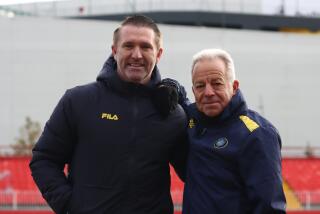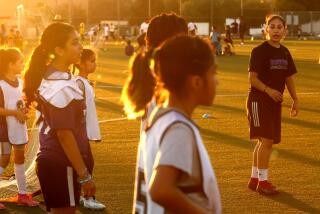For Iraqis, the Thrill of Soccer Is Back
- Share via
BAGHDAD — The most famous soccer star on the best team in Iraq played a mediocre match Friday and lost, along with his teammates, to a far less talented cross-town rival. But when the drubbing was over, Laith Hussein could not stop smiling.
“I’m going home,” he said.
Just months ago, such a defeat could have earned the soccer star a ride to prison on a bus with blacked-out windows, courtesy of Saddam Hussein’s son Uday. There, he might suffer a beating on the soles of his feet or be humiliated by having his head shaved and then trotted out in front of television cameras.
Not anymore.
“Home,” he said, still smiling. “Bye-bye.”
Friday’s showdown between the Zawraa Gulls and a team called the Police was Iraq’s first professional soccer match since the beginning of the war. But fans, coaches and players alike seemed quite uninterested in who won, who lost, who scored or who squandered an easy shot on goal.
Everybody was simply thrilled that soccer was back and that Uday Hussein and his father were not.
“God willing, the game will return to the game it should be,” said Ahmed Jamil, the Gulls’ equipment manager for 36 years. “And the country to the country it was.”
In a nation mad about soccer, the Iraqi teams of a generation ago often played respectably and drew tens of thousands of spectators regardless. Under Saddam Hussein’s regime, especially since the internal crackdowns and international sanctions following the 1991 Persian Gulf War, the sport floundered.
“For decades, Saddam Hussein built no soccer stadiums, only guns and wars,” said a 25-year Iraqi army conscript, who asked not to be identified. “We need soccer.”
Crumbling stadiums were often the least of a pro soccer player’s worries, however.
After the Iraqi leader installed his son in 1985 as chairman of the country’s Olympic Committee and overseer of Iraq’s national teams in every sport, players who performed poorly were harassed, fired, jailed and tortured.
Laith Hussein, who is not related to the former ruling family, once was placed in a steel contraption not unlike a suit of armor that required him to stand upright and unmoving for two days.
The entire national team was sometimes whisked from a losing match to a prison in a bus with shaded windows, held in solitary confinement and put through a brutal sort of boot camp that included beatings. The regimen took them to the brink of collapse and despair. They were held for days, even weeks, never knowing when -- or whether -- they’d be let out.
“It might have made us soldiers, but it didn’t make us better soccer players,” Gulls forward Ali Jawad, 21, said before Friday’s match.
In fact, such treatment diminished the level of their play considerably, said Ahmed Radhi, a legendary former player who is head coach of the Gulls as well as the national team.
“When we lost we were punished, so when we took to the field we were always afraid,” Radhi said. “All the players feel better today, playing without Uday around.”
Uday Hussein attended many matches at Baghdad’s Al Zawraa Stadium, where Friday’s match was played, keeping notes on players’ mistakes, meting out beatings and incarceration according to a bizarre tally system. Usually arriving with an entourage of henchmen, his appearance deeply unnerved the players and brought a pall over the crowd.
More than an hour before Friday’s match began, thousands of people were already in the bleachers, one side gleefully bellowing its team’s chant and the other retorting even louder.
“Go, go, go Police!” one side sang.
“The Police are sissies!” the other called back.
Then the chant changed, and both sides yelled: “Damn Saddam and damn the woman who gave birth to him!”
The cheering and chanting went back to soccer, and the match began. The 20,000-seat stadium was nearly filled, even though much of the city was still without power, lines for gasoline were hours-long and gunmen outnumbered police on the streets.
Both teams stumbled frequently, missing easy passes and what should have been quick goals. The Gulls’ goalkeeper collided with a Police forward and both went down hard. They then helped each other up.
Thirteen minutes into the first half, a Police forward scored with a skillful kick. The Gulls, widely regarded as the best team in the country, continued to struggle. The Police, ranked fourth or fifth, began to settle in.
In the Hussein era, Gulls players said, such a situation would have demanded the players’ utmost focus. But on Friday, even with his team down a goal, a Gulls player halted his warmup stretching to wrap his arm around a young fan near the sidelines while the boy’s father, way up in the stands, took a snapshot. Another wrestled a teammate for a chair, both of them laughing, while a third shouted good-natured catcalls at his coaches.
In the second half, the Police continued to dominate, scoring again for the upset victory. The Police, though, didn’t gloat, and the Gulls didn’t sulk. They hugged one another and waded into a frenzied crowd to embrace fans from both sides.
“I am so happy, happy, happy,” shouted lifelong Police fan Majid Hamid Kharasani. “I love all teams. In Iraq, everyone follows soccer. It is very important now to have the game back.”
Iraq’s national team is ranked No. 54 in the world. That’s not so bad, considering 204 countries are ranked, but neither does it suggest that Iraq will be much of a World Cup threat to teams such as England, Argentina, Italy and Brazil.
“Lots of countries are better than we are,” said the Gulls’ Hisham Mohammed. “That’s OK. But we did have lots of trophies. Unfortunately, all our trophies were stolen by looters. Someday we want to replace all our lost trophies with a World Cup trophy.”
More to Read
Go beyond the scoreboard
Get the latest on L.A.'s teams in the daily Sports Report newsletter.
You may occasionally receive promotional content from the Los Angeles Times.








